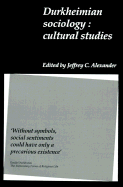Book contents
- Frontmatter
- Contents
- List of contributors
- Acknowledgements
- Introduction: Durkheimian sociology and cultural studies today
- Social change and sacralization
- Micro and macro in symbolic context
- 4 Religious elements in friendship: Durkheimian theory in an empirical context
- 5 The Durkheimian tradition in conflict sociology
- 6 Social structure and civil religion: legitimation crisis in a late Durkheimian perspective
- Ritualization and public life
- Index
4 - Religious elements in friendship: Durkheimian theory in an empirical context
Published online by Cambridge University Press: 05 July 2011
- Frontmatter
- Contents
- List of contributors
- Acknowledgements
- Introduction: Durkheimian sociology and cultural studies today
- Social change and sacralization
- Micro and macro in symbolic context
- 4 Religious elements in friendship: Durkheimian theory in an empirical context
- 5 The Durkheimian tradition in conflict sociology
- 6 Social structure and civil religion: legitimation crisis in a late Durkheimian perspective
- Ritualization and public life
- Index
Summary
Introduction
Emile Durkheim's work on religion is well known, but his work on friendship is not, perhaps because much of it exists in an as yet untranslated necrology that he wrote for his close friend, Victor Hommay. Although Durkheim wrote it early in his professional career, well before shifting his interests to the study of religion, this necrology contains some of the religious concepts elaborated later in The Elementary Forms of the Religious Life.
Durkheim briefly discusses friendship in The Division of Labor in Society (1964 [1893]:54–6), and alludes to it in Moral Education (1961 [1925]:240). Moreover, only a few social theorists have seriously analyzed the phenomenon of friendship as an important unit of social solidarity (Toennies 1957:42; Simmel 1950:326; Sorokin 1943:167, 1947:100; Collins 1975:124). Many more theorists have alluded to it only peripherally or implicitly in their writings (Parsons 1951:62, 189, 418; Blau 1964:36; Mullin 1979:35; Goffman 1983:8), and most have simply ignored it. Very few social theorists have compiled either quantitative or qualitative data on this phenomenon. In this chapter, we explore Durkheim's ideas on friendship. Arguing on the basis of interpretation as well as empirical data, we suggest that Durkheim viewed friendship as a functional alternative to religion for individuals in modern society.
Durkheim's preoccupation with social integration
Social solidarity – group cohesion based on shared values – is a theme that runs throughout Emile Durkheim's work.
- Type
- Chapter
- Information
- Durkheimian SociologyCultural Studies, pp. 93 - 106Publisher: Cambridge University PressPrint publication year: 1988
- 8
- Cited by



